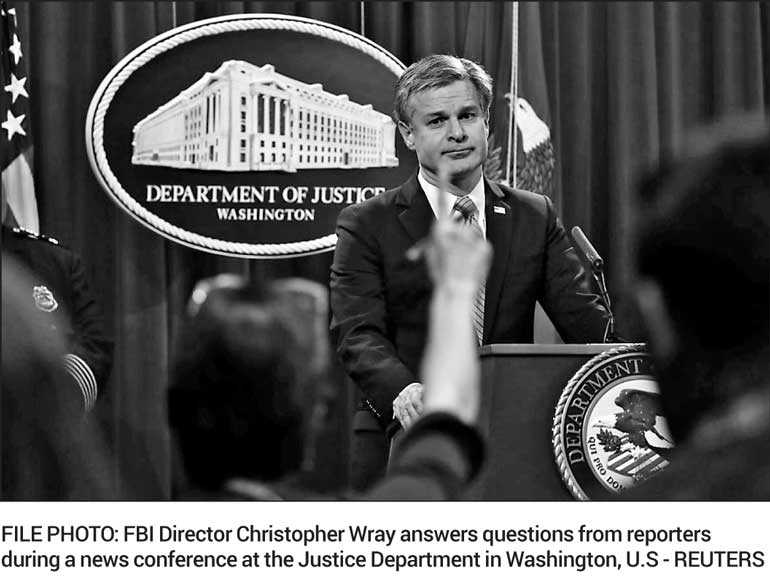Sunday Feb 22, 2026
Sunday Feb 22, 2026
Saturday, 22 December 2018 00:10 - - {{hitsCtrl.values.hits}}

WASHINGTON/LONDON (Reuters): The United States and three allies chastised China for economic espionage on Thursday, ratcheting up tensions as US prosecutors indicted two Chinese nationals linked to a spy agency on charges of stealing confidential data from American government agencies and businesses around the world.
Prosecutors charged Zhu Hua and Zhang Jianguo in hacking attacks against the US Navy, the space agency NASA and the Energy Department and dozens of companies. The operation targeted intellectual property and corporate secrets to give Chinese companies an unfair competitive advantage, they said.
Britain, Australia and New Zealand joined the United States in slamming China over what they called a global campaign of cyber-enabled commercial intellectual property theft, signaling growing global coordination against the practice.
“No country poses a broader, more severe long-term threat to our nation’s economy and cyber infrastructure than China,” FBI Director Chris Wray said at a news conference. “China’s goal, simply put, is to replace the US as the world’s leading superpower, and they’re using illegal methods to get there.”
Five sources familiar with the attacks told Reuters the hackers breached the networks of Hewlett Packard Enterprise Co. and IBM, then used the access to hack into their clients’ computers. IBM said it had no evidence that sensitive data had been compromised. HPE said it could not comment.
Secretary of State Mike Pompeo and other officials in President Donald Trump’s administration said China’s hacking effort, which US officials said began in 2006 and ran through 2018, violated a 2015 agreement intended to crack down on cyber espionage for commercial purposes.
Britain agreed. The campaign is “one of the most serious, strategically significant, persistent and potentially damaging set of cyber intrusions against the UK and our allies that we have seen,” a British security official said.
Victims included NASA’s Goddard Space Center and Jet Propulsion Laboratory, the Energy Department’s Lawrence Berkeley National Laboratory and companies involved in aviation, space and satellite technology, finance, electronics, healthcare, oil and gas exploration, according to court documents.
“The list of victim companies reads like a ‘Who’s Who’ of the global economy,” Wray said. He did not name the businesses.
Tensions between Washington and Beijing are high over tit-for-tat trade tariffs and after Meng Wanzhou, chief financial officer of Chinese telecommunications giant Huawei Technologies HWT.UL, was arrested in Canada at the request of the United States. Meng was arrested on the same day the United States and China agreed to talks to resolve the trade dispute.
Prosecutors charged the defendants, who they said worked with China’s Ministry of State Security intelligence agency, with conspiracy to commit computer intrusions, conspiracy to commit wire fraud and aggravated identity theft.
Zhu and Zhang were members of a hacking group known within the cyber security community as APT 10 and also worked for a Tianjin company Huaying Haitai Science and Technology Development Co, prosecutors said.
NASA said it did not believe agency missions were jeopardised by the hacking and took immediate action to secure affected servers. China’s embassy in Washington did not respond to a request for comment. APT10 also stole personal data including Social Security numbers from more than 100,000 US Navy personnel, they said.
A Navy spokesperson said that sailors are notified immediately when there is a data breach, but declined further comment due to an ongoing investigation.
The hacking targets also include technology firms that provide outsourced email, storage and other computing tasks, according to court documents.
This is the latest in a series of hacking cases brought by the United States against Chinese nationals.
In October, the US government charged Chinese intelligence officers with stealing information on a turbo fan engine used in commercial jetliners. The same month, the Justice Department arrested an alleged spy for China’s Ministry of State Security on charges of economic espionage and attempting to steal US aviation trade secrets.
In September, a Chinese national who had enlisted in the US Army Reserve was arrested in Chicago for allegedly working for Chinese intelligence to recruit engineers and scientists, including some who worked for US defence contractors.
Australian officials issued a statement expressing “serious concern” about Chinese commercial intellectual property theft. An official in New Zealand said in a statement the country “joins likeminded partners in expressing that such cyber campaigns are unacceptable.”
Canada, Japan, the Netherlands and Sweden also were expected to denounce Chinese cyber efforts, according to a source who spoke on condition of anonymity.